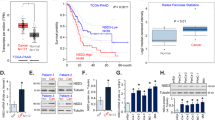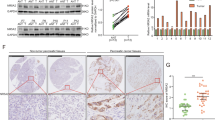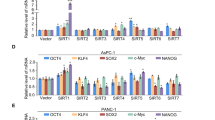Abstract
Pancreatic cancer (PC) is highly malignant and has a high mortality with a 5-year survival rate of less than 8%. As a member of the roundabout immunoglobulin superfamily of proteins, ROBO1 plays an important role in embryogenesis and organogenesis and also inhibits metastasis in PC. Our study was designed to explore whether ROBO1 has effects on the proliferation of PC and its specific mechanism. The expression of ROBO1 was higher in cancer tissues than in matched adjacent tissues by immunohistochemistry (IHC) and qRT-PCR. Low ROBO1 expression is associated with PC progression and poor prognosis. Overexpression of ROBO1 can inhibit the proliferation of PC cells in vitro, and the S phase fraction can also be induced. Further subcutaneous tumor formation in nude mice showed that ROBO1 overexpression can significantly inhibit tumor growth. YY1 was found to directly bind to the promoter region of ROBO1 to promote transcription by a luciferase reporter gene assay, a chromatin immunoprecipitation (ChIP) and an electrophoretic mobility shift assay (EMSA). Mechanistic studies showed that YY1 can inhibit the development of PC by directly regulating ROBO1 via the CCNA2/CDK2 axis. Taken together, our results suggest that ROBO1 may be involved in the development and progression of PC by regulating cell proliferation and shows that ROBO1 may be a novel and promising therapeutic target for PC.
This is a preview of subscription content, access via your institution
Access options
Subscribe to this journal
Receive 50 print issues and online access
$259.00 per year
only $5.18 per issue
Buy this article
- Purchase on Springer Link
- Instant access to full article PDF
Prices may be subject to local taxes which are calculated during checkout






Similar content being viewed by others
Data availability
All data generated or analyzed during this study are included in this published article.
References
Pommier A, Anaparthy N, Memos N, Kelley ZL, Gouronnec A, Yan R, et al. Unresolved endoplasmic reticulum stress engenders immune-resistant, latent pancreatic cancer metastases. Science. 2018;360:eaao4908.
Siegel RL, Miller KD, Jemal A. Cancer statistics, 2018. CA Cancer J Clin. 2018;68:7–30.
Chantrill LA, Nagrial AM, Watson C, Johns AL, Martyn-Smith M, Simpson S, et al. Precision medicine for advanced pancreas cancer: the individualized molecular pancreatic cancer therapy (IMPaCT) trial. Clin Cancer Res. 2015;21:2029–37.
Kamisawa T, Wood LD, Itoi T, Takaori K. Pancreatic cancer. Lancet. 2016;388:73–85.
Pinho AV, Van Bulck M, Chantrill L, Arshi M, Sklyarova T, Herrmann D, et al. ROBO2 is a stroma suppressor gene in the pancreas and acts via TGF-beta signalling. Nat Commun. 2018;9:5083.
Kong R, Yi F, Wen P, Liu J, Chen X, Ren J, et al. Myo9b is a key player in SLIT/ROBO-mediated lung tumor suppression. J Clin Invest. 2015;125:4407–20.
Xia Y, Wang L, Xu Z, Kong R, Wang F, Yin K, et al. Reduced USP33 expression in gastric cancer decreases inhibitory effects of Slit2-Robo1 signalling on cell migration and EMT. Cell Prolif. 2019;52:e12606.
Parray A, Siddique HR, Kuriger JK, Mishra SK, Rhim JS, Nelson HH, et al. ROBO1, a tumor suppressor and critical molecular barrier for localized tumor cells to acquire invasive phenotype: study in African-American and Caucasian prostate cancer models. Int J Cancer. 2014;135:2493–506.
Qin F, Zhang H, Ma L, Liu X, Dai K, Li W, et al. Low expression of Slit2 and Robo1 is associated with poor prognosis and brain-specific metastasis of breast cancer patients. Sci Rep. 2015;5:14430.
Gohrig A, Detjen KM, Hilfenhaus G, Korner JL, Welzel M, Arsenic R, et al. Axon guidance factor SLIT2 inhibits neural invasion and metastasis in pancreatic cancer. Cancer Res. 2014;74:1529–40.
Zhang JJ, Zhu Y, Zhang XF, Liu DF, Wang Y, Yang C, et al. Yin Yang-1 suppresses pancreatic ductal adenocarcinoma cell proliferation and tumor growth by regulating SOX2OT-SOX2 axis. Cancer Lett. 2017;408:144–54.
Zhang JJ, Zhu Y, Xie KL, Peng YP, Tao JQ, Tang J, et al. Yin Yang-1 suppresses invasion and metastasis of pancreatic ductal adenocarcinoma by downregulating MMP10 in a MUC4/ErbB2/p38/MEF2C-dependent mechanism. Mol Cancer. 2014;13:130.
Gopinathan L, Tan SL, Padmakumar VC, Coppola V, Tessarollo L, Kaldis P. Loss of Cdk2 and cyclin A2 impairs cell proliferation and tumorigenesis. Cancer Res. 2014;74:3870–9.
Liu J, Hou W, Guan T, Tang L, Zhu X, Li Y, et al. Slit2/Robo1 signaling is involved in angiogenesis of glomerular endothelial cells exposed to a diabetic-like environment. Angiogenesis. 2018;21:237–49.
Leyva-Diaz E, del Toro D, Menal MJ, Cambray S, Susin R, Tessier-Lavigne M, et al. FLRT3 is a Robo1-interacting protein that determines Netrin-1 attraction in developing axons. Curr Biol. 2014;24:494–508.
Tang W, Zhou W, Xiang L, Wu X, Zhang P, Wang J, et al. The p300/YY1/miR-500a-5p/HDAC2 signalling axis regulates cell proliferation in human colorectal cancer. Nat Commun. 2019;10:663.
Patten DK, Corleone G, Gyorffy B, Perone Y, Slaven N, Barozzi I, et al. Enhancer mapping uncovers phenotypic heterogeneity and evolution in patients with luminal breast cancer. Nat Med. 2018;24:1469–80.
Gao D, Wang L, Zhang H, Yan X, Yang J, Zhou R, et al. Spleen tyrosine kinase SYK(L) interacts with YY1 and coordinately suppresses SNAI2 transcription in lung cancer cells. FEBS J. 2018;285:4229–45.
Liu D, Zhang J, Wu Y, Shi G, Yuan H, Lu Z, et al. YY1 suppresses proliferation and migration of pancreatic ductal adenocarcinoma by regulating the CDKN3/MdM2/P53/P21 signaling pathway. Int J Cancer. 2018;142:1392–404.
Dachineni R, Ai G, Kumar DR, Sadhu SS, Tummala H, Bhat GJ. Cyclin A2 and CDK2 as novel targets of aspirin and salicylic acid: a potential role in cancer prevention. Mol Cancer Res. 2016;14:241–52.
Zhang QH, Yuen WS, Adhikari D, Flegg JA, FitzHarris G, Conti M, et al. Cyclin A2 modulates kinetochore-microtubule attachment in meiosis II. J Cell Biol. 2017;216:3133–43.
Honda A, Valogne Y, Bou Nader M, Brechot C, Faivre J. An intron-retaining splice variant of human cyclin A2, expressed in adult differentiated tissues, induces a G1/S cell cycle arrest in vitro. PLoS One. 2012;7:e39249.
Wang B, Li D, Kovalchuk A, Litvinov D, Kovalchuk O. Ionizing radiation-inducible miR-27b suppresses leukemia proliferation via targeting cyclin A2. Int J Radiat Oncol Biol Phys. 2014;90:53–62.
Peng X, Pan K, Zhao W, Zhang J, Yuan S, Wen X, et al. NPTX1 inhibits colon cancer cell proliferation through down-regulating cyclin A2 and CDK2 expression. Cell Biol Int. 2018;42:589–97.
Moore NL, Edwards DP, Weigel NL. Cyclin A2 and its associated kinase activity are required for optimal induction of progesterone receptor target genes in breast cancer cells. J Steroid Biochem Mol Biol. 2014;144(Pt B):471–82.
Funding
This study was supported by the National Natural Science Foundation of China (Nos. 81871980, 81572337, 81672449); the National Science Foundation for Distinguished Young Scholars of China (No. 81902455); the Jiangsu Key Medical Discipline (General Surgery; ZDXKA2016005); the Innovation Capability Development Project of Jiangsu Province (No. BM2015004); the Priority Academic Program AQ3 Development of Jiangsu Higher Education Institutions (PAPD, JX10231801) and the Project of Invigorating Health Care through Science, Technology and Education, Jiangsu Provincial Medical Outstanding Talent (to Yi Miao, JCRCA2016009).
Author information
Authors and Affiliations
Contributions
QC, PS, WLG and TYY carried out the studies, participated in the experimental design, statistical analysis and drafted the manuscript. LDM and WJW participated in the luciferase reporter assays and ChIP assays. XMH and YHZ participated in the qRT-PCR and Western blotting. SJC participated in the sample collection, patient follow-up and statistical analysis. QC and WJW carried out the in vivo studies and participated in the statistical analysis. KRJ, JJZ and YM critically revised the manuscript for important intellectual content. All authors read and approved the final manuscript.
Corresponding authors
Ethics declarations
Conflict of interest
The authors declare no competing interests.
Ethical approval
This study was approved by the Ethics Committee of the First Affiliated Hospital with Nanjing Medical University.
Additional information
Publisher’s note Springer Nature remains neutral with regard to jurisdictional claims in published maps and institutional affiliations.
Supplementary information
Rights and permissions
About this article
Cite this article
Chen, Q., Shen, P., Ge, WL. et al. Roundabout homolog 1 inhibits proliferation via the YY1-ROBO1-CCNA2-CDK2 axis in human pancreatic cancer. Oncogene 40, 2772–2784 (2021). https://doi.org/10.1038/s41388-021-01741-5
Received:
Revised:
Accepted:
Published:
Issue Date:
DOI: https://doi.org/10.1038/s41388-021-01741-5
This article is cited by
-
Risk SNP in a transcript of RP11-638I2.4 increases lncRNA–YY1 interaction and pancreatic cancer susceptibility
Archives of Toxicology (2023)
-
ROBO3s: a novel ROBO3 short isoform promoting breast cancer aggressiveness
Cell Death & Disease (2022)



